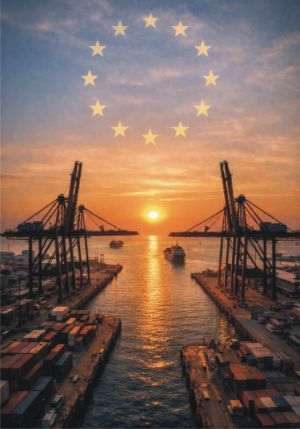Ursula von der Leyen will present today, in the European Parliament, the official speech on the State of the European Union, one year after the previous speech and four years after assuming the mandate of president of the European Commission. Von der Leyen recently announced that 92% of the commitments made in autumn 2019 have already been implemented. The content of Ursula von der Leyen's last State of the European Union speech - given the fact that next autumn we will have a new president following the European Parliament elections in early July 2024 - is one of Brussels' best-kept secrets. However, MEPs expect the European Commission president's speech to focus on three main themes: migration, the Green Deal and support for Ukraine.
As for Ukraine, political analysts estimate that Ursula von der Leyen will emphasize EU expansion and will urge the community bloc to take the necessary momentum to support the authorities in Kiev on the road to accession, as well as those in the Republic of Moldova and the Balkans from the West.
On migration, Von der Leyen hopes the EU-funded euro785m deal with Tunisia, which offers budget support and investment in exchange for better control of migrants leaving the North African nation, will become a model for similar agreements with North African countries, and European citizens will consider it as proof of solving the problem of illegal migration in Europe. MEPs, however, are waiting for a well-defined timetable for the completion of several legislative files aimed at revising EU rules on immigration and asylum, especially for the south-eastern area, on the border between Bulgaria and Turkey. The problem for the President of the European Commission is that the main political groups are already in the election campaign. The European People's Party (EPP), of which von der Leyen is a member, is trying to gain political ground on the migration control issue against nationalist parties such as Giorgia Meloni's Fratelli d'Italia and Spain's Vox.
Regarding the implementation of the Green Deal, the European social democrats have already positioned themselves, requesting through the president Iratxe Garcia Perez the strengthening of the social pillar by the European Commission. MEPs from the Alliance of Socialists & Democrats call for support for citizens to cope with the rising cost of living.
Instead, the Greens group calls for more action to protect the environment. They believe that the Commission still has a lot to do on the Green Deal, especially since the fires and floods in southern Europe in recent years show us in a dramatic way the consequences of the climate crisis. The Greens believe that the best prevention is taking quick and concrete measures to protect the environment. According to them the implementation of the Fit-for-55 package must be a success, even against resistance from the EPP.
However, some MEPs hope that von der Leyen's speech today will heed warnings from the industry over the past year about the burden of the Net Zero law and shift the focus from new laws to the implementation of what already agreed upon. They believe that environmental protection is better achieved through technical innovation than through standards that restrict the economy, a position with which Manfred Weber, the president of the EPP, who recently declared himself on the side of companies' position on climate policy, agrees.
• 117-page report with the achievements of the Commission in the last year
As I mentioned above, there is no document on the European Commission page regarding the speech that Ursula von der Leyen will deliver today in the European Parliament. Instead we have a 117-page presentation of the Commission's achievements in the period September 2022-September 2023. Structured in four chapters - Defending Europe's promise, Investing in Europe's prosperity and Strengthening Europe's societal resilience - the document is a review of the support given to Ukraine in the last 12 months, the 11 packages of sanctions dictated against the Russian Federation, Russian politicians, certain companies and oligarchs close to Vladimir Putin, as well as investments in the energy field, the green transition, but also resilience and the reduction of gaps between member states .
According to the cited document, since the start of the invasion, the EU and its member states have mobilized financial, humanitarian, emergency and military assistance in the amount of 59 billion euros, of which an amount of 38.8 billion euros has been allocated (31 billion euros from the EU budget and 7.8 billion euros from the budgets of the member states) for strengthening the economic, societal and financial resilience of Ukraine.
"Besides the 38.8 billion euros, the EU has allocated more than 20 billion euros for the military assistance needed by the Ukrainian forces, of which 5.6 billion euros were diverted from the European Instrument for Peace. In addition, the EU and its member states have mobilized at least 17 billion euros to support refugees in Ukraine. In fact, the total support given to Ukraine and its people is 76 billion euros," states the State of the Union 2023 report.
In 2023, the EU also offered Ukraine a support package of 18 billion euros, in the form of very advantageous loans, of which 12 billion euros have already been paid to ensure salaries and pensions in that country, maintaining essential public services - hospitals, schools and housing for displaced people -, ensuring macroeconomic stability and rebuilding critical infrastructure that has been destroyed.
The document also shows that 49 million tons of Ukrainian agricultural products were transited through Europe, with a total value of 99 billion euros.
In addition to the above financial support, the report also shows that the EU paid 7.5 million euros to support the investigations carried out by the International Criminal Court into war crimes committed on the Ukrainian front.
The State of the Union report also mentions investments in the production of energy from renewable sources, the start of projects through the Just Transition Fund, investments in battery production capacities and some energy storage capacities, as well as digitalization, but also how they have the 153.4 billion euros paid by the Commission to the Member States through the Recovery and Resilience Mechanism of the NextGeneration EU program have been spent so far.
Regarding the way in which the cohesion policy funds were spent, Romania appears in the document with the bridge over the Danube, almost 2 kilometers long, from Brăila, for which the EU allocated 363 million euros.
• The scandal of the purchase of Covid 19 vaccines does not appear in the 2023 State of the Union report
In the cited document, there is not a single line about the scandal of the acquisition in 2021 by the European Commission of anti-Covid 19 vaccines from the American company Pfizer. The scandal, which broke out in the spring of last year, gained momentum after, at the end of September 2022, the European Public Prosecutor's Office announced that it had a criminal investigation file in rem (on the facts) under way regarding how the negotiations with the Pfizer company and to the contract signed in May 2021 by the European Commission for the purchase of vaccines. Apart from this file, the European Public Prosecutor's Office also has a criminal complaint sent by representatives of the Identity and Democracy political group in the European Parliament, which accuses Ursula von der Leyen of secret negotiations with Albert Bourla, CEO of the Pfizer company, before signing the contract with the pharmaceutical giant.
We remind you that the whole scandal regarding the exchange of messages on WhatsApp between Ursula von der Leyen and Albert Bourla began in April 2021, when the American publication The New York Times revealed how the president of the European Commission concluded an agreement on anti-Covid-19 vaccines with the Pfizer company. American journalists showed that Ursula von der Leyen "exchanged messages and calls" with Albert Bourla a month before signing the contract for the purchase of 1.8 billion doses of the anti-Covid 19 vaccine from the Pfizer company. A few weeks after the New York Times article, journalist Alexander Fanta of the news website netzpolitik.org requested access to these messages exchanged between von der Leyen and Bourla. The European Commission replied that it "did not identify" these messages and that it does not possess them. Alexander Fanta immediately turned to the EU Ombudsman, Emily O'Reilly, who in January 2022 ordered the EU Executive "to carry out a more in-depth search of the relevant messages". The response received by the EU Ombudsman at the end of June 2022 from the Commissioner for Transparency Vera Jourova was: "the search for these SMS did not yield any results". Faced with this response, Emily O'Reilly stated that the processing of this request for access to documents "leaves the regrettable impression of a European institution that is not honest in matters of major public interest".
In January 2023, The New York Times took the case to the Court of Justice of the European Union. After this approach, a criminal case against Ursula von der Leyen appeared. The Belgian lobbyist, Frederic Baldan, submitted, on April 5, 2023, a criminal complaint to the court in Liege, in which he accuses Ursula von der Leyen of "usurpation of office and title", "destruction of public documents", "illegal deprivation of interests and corruption".
Baldan claims that the president of the European Commission replaced the Belgian federal government during the Covid-19 pandemic by negotiating a mega-contract of vaccines via SMS, via WhatsApp, with Albert Bourla, the CEO of Pfizer, with whom Comission concluded a contract worth 35 billion euros for anti-Covid vaccines. The complainant states that the messages subsequently deleted by Ursula von der Leyen are administrative documents in their own right, which can therefore be consulted by any European citizen who requests them. In his support, Frederic Baldan brings as an argument Article 42 of the Charter of Fundamental Rights of the EU, which grants a right of access to European Union documents "regardless of their support". The Belgian lobbyist states that the text of Article 42 also refers to text messages sent on WhatsApp.
However, so far in none of the respective cases Ursula von der Leyen has been called by prosecutors or judges to provide clarifications regarding the respective situation. The file from the European Public Prosecutor's Office has been investigated in rem for a year, the one from the Court of Justice of the European Union has not yet had a first fixed term, and the complaint of the Belgian Frederic Baldan is still being processed in the courts of that country.
We also add that from the State of the European Union 2023 report, although it talks about the rule of law, there is no mention of the scandal that shook the European Parliament and also targeted some directors of the European Commission at the end of last year and the beginning of this year: Qatargate .
It seems that the officials of the European Executive have chosen to hide the garbage under the rug and present only the achievements.




























































